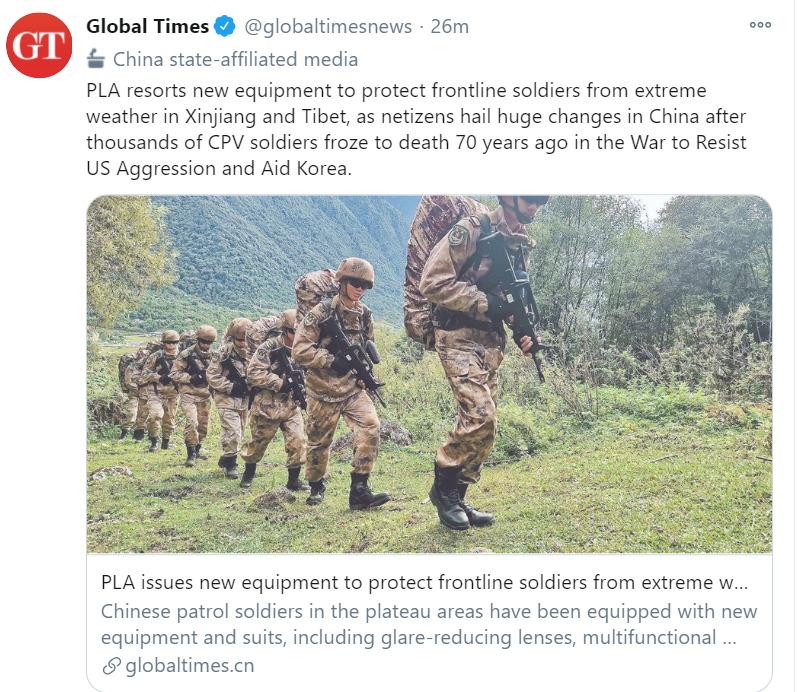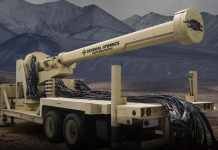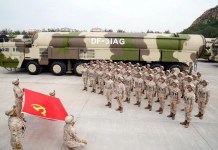With China issuing new equipment to protect frontline PLA soldiers from extreme weather in Xinjiang and Tibet, the Chinese netizens are drawing comparisons to a brutal battle scenario in 1950, in which thousands of Chinese soldiers froze to death due to extreme cold.
India Goes Roaring Into Africa; Looks To Ink Defence & Other Key Pacts With Morocco
According to a report by Chinese state-run Global Times, the PLA patrol soldiers in the plateau areas have been equipped with new equipment and suits, including glare-reducing lenses, multifunctional kettles and cold protective suits, to protect them from extreme weather.
Global Times uploaded a tweet of the report comparing the helplessness of the soldiers in the Korean War expressed by the citizens. However, the tweet was quickly taken down by the state-owned media house. EurAsian News managed to grab a screenshot of the deleted tweet.

According to the report, the troops have been supplied with 15 kinds of equipment and suits to meet the requirements of patrolling in temperatures ranging from – 40 C to 30 C.
Drawing a contrast to the 1950 Korean War, many social media users in China expressed their appreciation of the modern military prowess enjoyed by the country.
“Seventy years ago, our soldiers could only wear summer suits in temperatures many degrees below zero. 70 years later, everything has changed and our country has become strong. It’s good to see!” one Chinese social media app Weibo user commented.
The Korean War, which was fought between a coalition of South Korean and United Nations forces, led by the US, against communist-backed troops from the North, resulted in around 100,000 Chinese troops trapping American forces in the harshest territory—in temperatures that regularly fell to 25 degrees below zero.
The place described by the American veterans who survived the war in a chilling account, say “it was too frigid to dig foxholes without explosives and bulldozers, combatants piled frozen bodies in lieu of sandbags.
One account given by History Channel describes the battle environment as being so brutal that the “feet froze into blocks of ice inside boots. Even bullet wounds sometimes froze, keeping soldiers from bleeding out until they went inside heated tents.”
According to the Korean War researcher, Ned Forney, the Chosin Reservoir battle has become one of the most storied exploits of grit and sacrifice in Marine Corps history.
The US marines Commanding General Oliver P. Smith issued a stern statement as the Chinese troops kept gaining on their positions: “Retreat, hell. We’re not retreating. We’re just advancing in another direction.”
Forney describes the war-fighting conditions in the winter of 1950: “in bitter cold and brutal terrain, men endured severe frostbite, sleepless nights, and total mental and physical exhaustion. Below-zero temperatures, snow-covered mountains, icy roads, and wind-swept cliffs made every skirmish, firefight, and attack a nightmare beyond the men’s wildest dreams.”
The North Korean forces, led by Chinese premier Mao Zedong launched a heavy assault on1st Marine Division, and in the process lost an estimated 50,000 soldiers. The Chinese soldiers fought with extreme dedication and bravery and were ruthless in decimating the rival army.
China is celebrating the 70th anniversary of the Chinese People’s Volunteers (CPV) army’s participation in what it calls the “War to Resist US Aggression and Aid Korea (1950-53).”
70 years down the line, the communist country has come a long way, and today, enjoys immense economic and military clout in this part of the world.
With the country locked in a fierce stand-off with Indian soldiers in the Himalayan region of Ladakh, where the winter temperatures can reach as low as minus 30 C, China is making full preparations.
The Indian government also made an urgent purchase of additional high-altitude winter clothing from the US for its troops stationed at dizzying heights in Ladakh. The Logistics Exchange Memorandum Agreement (LEMOA) between India and the US facilitates logistical support, supplies, and services between the armed forces of the two countries. These include clothing, food, lubricants, spare parts, medical services among other essentials.
The two countries are awaiting the eighth round of Corps Commander talks this week to de-escalate the tensions along the Line of Actual Control (LAC). The previous military and diplomatic negotiations have consecutively failed, with neither side relinquishing their demands to diffuse the tensions.




